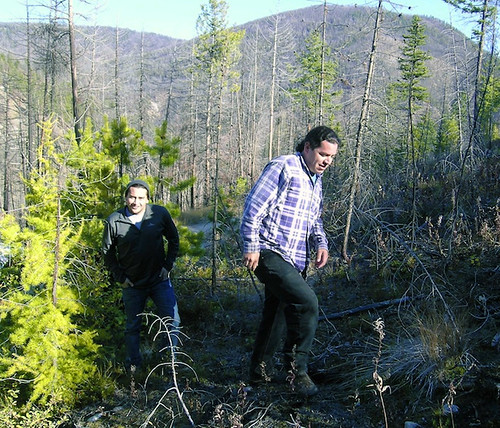
As part of the Forest Service’s Pacific Northwest Research Station’s Recovery Act program, the Station’s Focused Science Delivery Program has entered into an agreement with the University of Washington’s School of Forest Resources to create leadership and learning opportunities for Native Americans pursuing graduate degrees in the forestry sciences.
Students, who are tribal members, are offered financial, educational, cultural, and social support and are provided with mentored work experiences on research projects in their field of interest. The skills, knowledge, and experience gained by these students significantly enhance their ability to contribute to the advancement of science-based forestry both on and off of tribal lands. In addition, their ability to integrate traditional knowledge with modern science has significant benefits to both the university and the research agencies they work for.
As of this date, three Native American graduate students have been recruited and are working on research projects led by Station scientists and university faculty. Two students, Tmthspusmen “Spus” Wilder and Jeromie Gritts, enrolled at the beginning of the 2010-2011 academic year. A third student, Christopher Beatty, is doing project work during the summer and will begin coursework in the fall of 2011.
Wilder is interested in the ecological effects of different policy frameworks and restoration practices among forest landowners east of the Cascade Mountains. His research project will examine stand structure and composition parameters on national forest, state, and Yakama tribal lands in eastern Washington to determine how forest health is affected by management and restoration strategies. During last summer, Wilder assisted with research projects conducted by the PNW Station on the Gifford Pinchot National Forest, and at the Forest Service Pacific Wildland Fire Sciences Laboratory in Seattle.
Gritts’ research project will examine the decline of whitebark pine on the Flathead Reservation in Montana. He is working under the mentorship of scientists at the Forest Service Rocky Mountain Research Station to model the effects of different silvicultural and fire management regimes on whitebark pine. His research will factor in the cultural values tribes associate with whitebark pine which are not typically included in ecological studies.
Both men have been involved with other Native American students in efforts to integrate traditional knowledge with forestry sciences, and have co-authored a paper that has been submitted for publication. They have also been assisting with the development of a national natural resources research agenda for the Intertribal Timber Council. They have also helped develop and administer a questionnaire for tribal managers and leaders to ascertain research needs.
